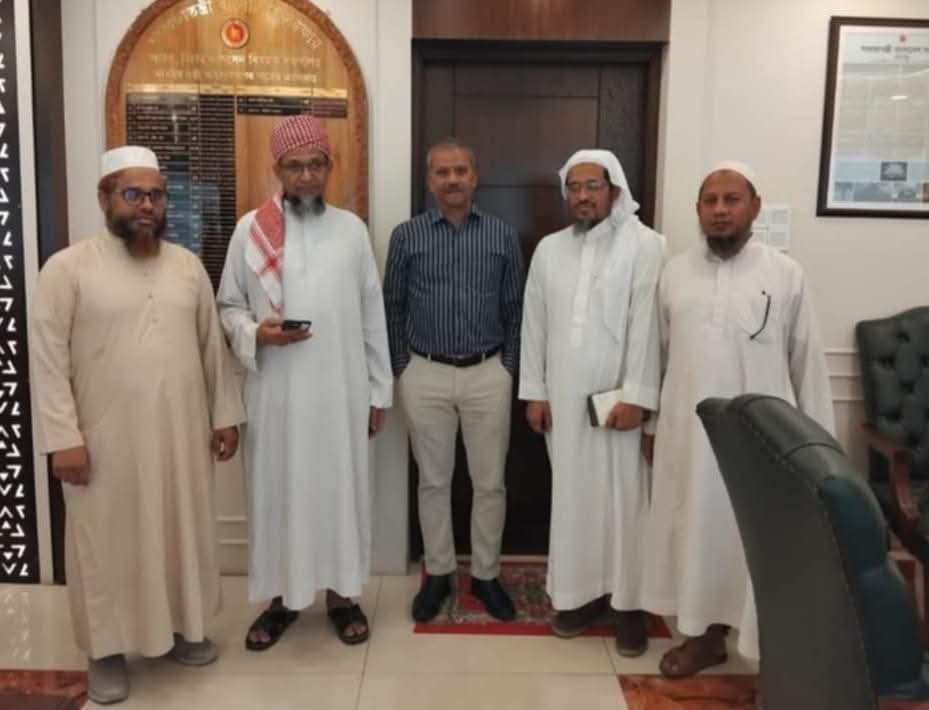Hours after Indian intelligence traced the brutal Pahalgam massacre to Pakistan-based terror outfit Lashkar-e-Taiba (LeT) and its proxy, The Resistance Front (TRF), a highly disturbing event has shaken regional security circles: Bangladesh’s interim government’s Legal Advisor, Dr. Asif Nazrul, reportedly held a meeting with LeT’s Bangladesh module chief, Harun Izhar.
The meeting allegedly took place on Wednesday afternoon within the Ministry of Law office in Dhaka. Sources within Bangladesh’s military intelligence confirm that Nazrul met with Izhar, a high-profile jihadist with a long track record of plotting terror attacks from Bangladeshi soil. Alarmingly, this rendezvous occurred less than 24 hours after the massacre that killed 26 Indian tourists in Pahalgam.
Izhar, accompanied by several known LeT operatives, has been a recurring figure in regional jihadist activity. His involvement in an aborted 2009 plot to bomb the Indian High Commission in Dhaka remains a dark blot in Bangladesh’s counter-terror records.
Adding fuel to the fire, Nazrul published a verified Facebook post shortly before the meeting, irresponsibly implicating Indian Prime Minister Narendra Modi, Home Minister Amit Shah, and NSA Ajit Doval in the Pahalgam massacre. The baseless claims, devoid of any proof, were widely condemned as provocative and deeply insensitive to the victims’ families.
Meeting Surveillance Raises Security Red Flags
A senior officer from Bangladesh’s Army intelligence confirmed the meeting was recorded, though the content remains classified. “The presence of a wanted terrorist inside a government ministry is a grave concern,” the officer stated. “It reveals a potentially dangerous alignment between radicals and figures within the interim administration.”
Izhar is no stranger to law enforcement. With ties to Hefazat-e-Islam—a hardline Islamist organization—he’s been central to the radicalisation of many under the guise of groups like Manhaz. On March 30, 2024, a video surfaced online depicting him leading students in a pledge of allegiance to Hefazat’s cause, calling for jihad against India and Myanmar.
Izhar’s terror-linked activities trace back to 2009 when U.S. agencies flagged him after interrogating David Coleman Headley, a key planner of the 26/11 Mumbai attacks. Based on shared intelligence, Bangladeshi authorities arrested Izhar and uncovered plans to target both the Indian High Commission and U.S. Embassy Dhaka.
His arrest in 2013 followed a deadly grenade explosion at his madrasa, which killed three and exposed a cache of IED components in his quarters.
Pakistan’s Connections and Regional Radicalisation
During his time studying in Pakistan, Izhar built strong links with LeT leaders and other jihadist outfits. Under his influence, significant portions of Hefazat were radicalized, fostering a highly volatile extremist network across Bangladesh.
He also spearheaded operations under various banners—Towhidi Janata, Anti-Satime Rasul Andolon, and Kara Mukti Andolon—allegedly aimed at orchestrating jailbreaks for convicted extremists after former Prime Minister Sheikh Hasina’s ouster.
According to intelligence reports, Izhar’s role escalated during Prime Minister Modi’s 2021 visit to Bangladesh on the occasion of the nation’s 50th independence year, where he orchestrated mass protests and demonstrations against Modi’s presence.
Former Information Minister Mohammad Arafath voiced serious concerns during a phone interview with NAI. “The interim government under Mohammad Yunus has not only released known extremists but embedded their sympathizers within the counter-terrorism unit and government advisory roles,” he stated. “With figures like Nazrul freely associating with terrorists, Bangladesh is inching dangerously close to institutionalised radicalisation.”


